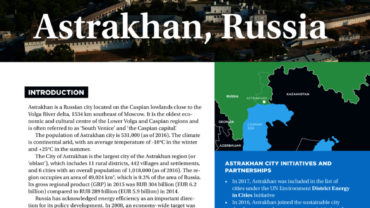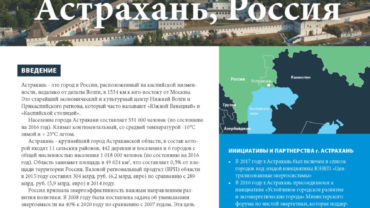The Copenhagen Centre, with support from the Danfoss Foundation under the UN Environment District Energy in Cities Initiative, is working with the City of Astrakhan to improve and support its energy efficiency across different sectors with a focus on buildings and district energy.
Russia has acknowledged energy efficiency as an important direction for its policy development. In 2008, an economy-wide target was set to reduce energy intensity by 40% by 2020 in relation to 2007. Astrakhan in Russia has an ambition to become a flagship sustainable city and a model for regional replication. Driven by the strong motivation of the city administration, as well as engagement of local and international experts, the city is developing a holistic ‘Astrakhan – Sustainable City’ programme to achieve higher living standards for its residents, with energy efficiency being one of the programme’s key components.
As the global energy efficiency hub of Sustainable Energy for All, the Copenhagen Centre on Energy Efficiency acts to connect aspiring countries, cities and districts with the technology, service and finance providers who can convert their ambition into agreed policies, funded projects and real results. These direct engagements can then be used to provide a model of coordination that can be replicated elsewhere.
As a part of this dialogue process, the Centre produces a summary of the opportunities and issues uncovered as an ‘Energy Efficiency Brief’, which provides a signpost towards the joint work that we will progress in the location.
The energy efficiency brief related to the City of Astrakhan was released today at the International Mayor’s Energy Summit during the International Forum on Energy Efficiency and Energy Development ‘Russian Energy Week’ in Moscow. Highlights of the brief include:
- Energy-efficient renovation of existing municipal and residential buildings together with modernization of heat supply and distribution facilities will offer a synergetic effect for increasing the city’s sustainability, together with other benefits such as higher levels of comfort, energy cost savings, increase in property values, job creation, and improvement of health and productivity.
- The City would benefit from joining international city energy efficiency networks (such as the SEforALL Building Efficiency Accelerator and C40); actively working with existing national platforms in Russia (e.g. under the G20 and Clean Energy Ministerial processes); and establishing a network of cities in the Caspian region to share the lessons learnt and provide the base for further replication.


